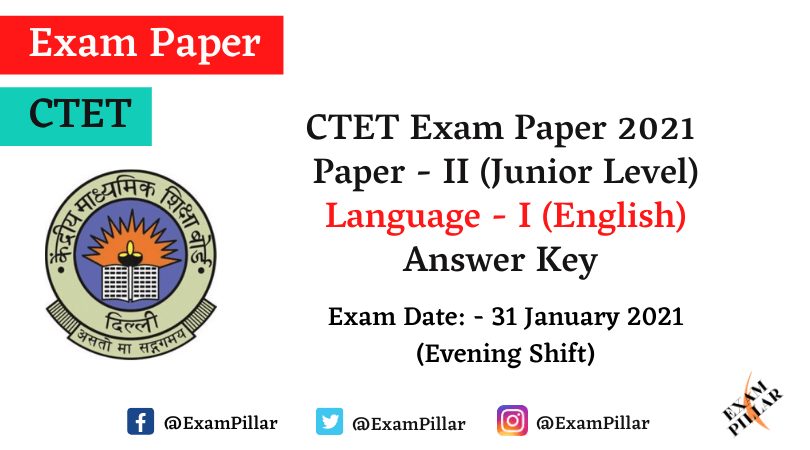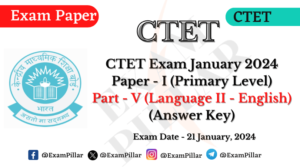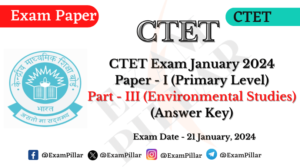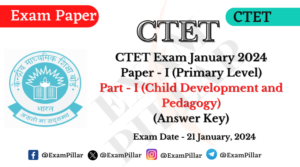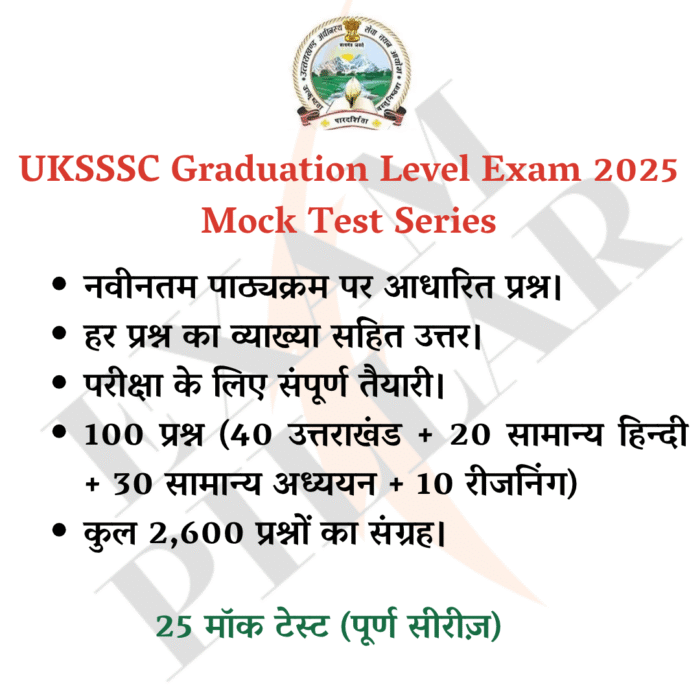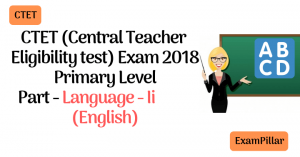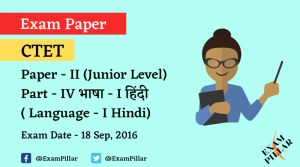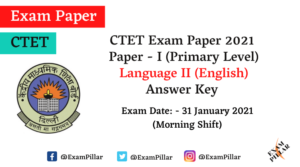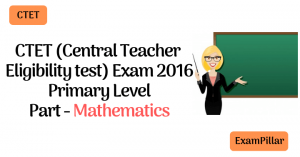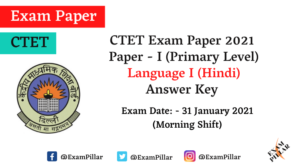CBSE conducted the CTET (Central Teacher Eligibility Test) Exam Paper 2020. This Paper held on 31st January 2021 Evening Shift. Here The CTET Paper-II (Junior Level Class 6 to 8), Part – IV Language I (English) Solved Question Paper. CTET January 2021 Question Paper with Answer Key.
CTET (Central Teachers Eligibility Test)
Paper – II Junior Level (Class 6 to Class 8)
परीक्षा (Exam) – CTET Paper I Junior Level (Class VI to VIII)
भाग (Part) – Part – IV Language I (English)
परीक्षा आयोजक (Organized) – CBSE
कुल प्रश्न (Number of Question) – 30
Paper Set – O
परीक्षा तिथि (Exam Date) – 31st January 2021
| CTET Exam Paper-II Jan 2021 | Link |
| CTET 31 Jan 2021 Paper II – Part – I (Child Development and Pedagogy) | Click Here |
| CTET 31 Jan 2021 Paper II – Part – III (Social Studies / Social Science) | Click Here |
| CTET 31 Jan 2021 Paper II – Part – IV (Language – I English) | Click Here |
| CTET 31 Jan 2021 Paper II – Part – IV (Language – I Hindi) | Click Here |
| CTET 31 Jan 2021 Paper II – Part – V (Language – II English) | Click Here |
| CTET Exam Paper-I Jan 2021 | Link |
| CTET 31 Jan 2021 Paper I – Part – I (Child Development and Pedagogy) | Click Here |
| CTET 31 Jan 2021 Paper I – Part – II (Mathematics) | Click Here |
| CTET 31 Jan 2021 Paper I – Part – III (Environmental Studies) | Click Here |
| CTET 31 Jan 2021 Paper I – Part – IV Language I (English) | Click Here |
| CTET 31 Jan 2021 Paper I – Part – IV Language I (Hindi) | Click Here |
| CTET 31 Jan 2021 Paper I – Part – V Language II (Hindi) | Click Here |
| CTET 31 Jan 2021 Paper I – Part – V Language II (English) | Click Here |
CTET Exam January 2021 Paper – 2 (Junior Level)
Part – IV Language I (English)
(Official Answer Key)
Directions : Read the passage given below and answer the questions (Q. Nos. 91 – 99) We follow by selecting the correct/most appropriate options :
The very nature of the mind is restlessness. It cannot stay in one place for long or hold one thought for long. For every thought which appears, there are comments, judgement and associations. Thinking is a continuous activity. The mind jumps from one thought to another and gives us no rest from morning till night. Like clouds in the sky or waves in the ocean, the thoughts appear and disappear as if in ceaseless activity.
However, all the thoughts that pass through our mind do not affect us. We get affected when our ego is hit. Then the mind whirls and creates a tornado of restlessness within. A variety of probable scenarios crop up. ‘how dare he insult me; What does she think of herself? Where I am not respected, I will not go; If he speaks thus I will reply so’. And so it goes on and on.
We have an inbuilt filter in our mind which chooses the types of thoughts or subjects to brood upon. We are not born with this filter but we acquire it over the years with the kind of books we read and the company we keep and the subjects that we are interested in.
That is why some people are obsessed with football or cricket or fashions and others could not care less about such things. This filter is built day by day by our actions, suggestions, teachings and influence of others. We can ultimately choose our own filter. So let us learn to build our filter wisely and strengthen it daily.
91. Which part of speech is the underlined word in the following expression ?
‘It cannot stay at one place.’
(1) Particle
(2) Adverb
(3) Determiner
(4) Pronoun
Show Answer/Hide
92. ‘as if in ceaseless activity’
The word ‘ceaseless’ means
(1) temporary
(2) flawless
(3) permanent
(4) continuous
Show Answer/Hide
93. ‘creates a tornado of restlessness’
The word ‘tornado’ here means
(1) storm
(2) mixture
(3) waterfall
(4) confusion
Show Answer/Hide
94. Thoughts are compared to
(1) associations
(2) clouds
(3) comments
(4) judgements
Show Answer/Hide
95. The process of thinking continues from
(1) morning to night
(2) year to year
(3) day to day
(4) week to week
Show Answer/Hide
96. Thoughts affect us when our
(1) learning is affected.
(2) pride is hurt.
(3) job is affected.
(4) sleep is disturbed.
Show Answer/Hide
97. Read the following statements :
A. Our reading decides the filter in our minds.
B. The filter in our mind controls our likes but not dislikes.
(1) A is correct and B is incorrect.
(2) A is incorrect and B is correct.
(3) Both A and B are correct.
(4) Both A and B are incorrect.
Show Answer/Hide
98. Which of the following statements is incorrect?
(1) The filter in our minds influences our actions.
(2) Our thoughts do not remain stuck at one point.
(3) Each one of us has an inborn filter in our mind.
(4) We like to be respected when we go somewhere.
Show Answer/Hide
99. Which part of speech is the underlined word in the following expression ?
‘But we get affected’?
(1) Adverb
(2) Particle
(3) Verb
(4) Adjective
Show Answer/Hide
Directions : Read the poem given below and answer the questions (Q. Nos. 100 – 105) that follow by selecting the correct/most appropriate options :
That time of year thou mayst in me behold,
When yellow leaves, or none, or few do hang
Upon those boughs which shake against the cold
Bare ruined choirs, where late the sweet birds sang.
In me thou seest the twilight of such day,
As after sunset fadeth in the west,
Which by and by black night doth take away,
Death’s second self that seals up all in rest.
In me thou seest the glowing of such fire,
That on the ashes of his youth doth lie,
As the death-bed, whereon it must expire,
Consumed with that which it was nourished by.
This thou perceiv’st, which makes thy love more strong,
To love that well, which thou must leave the long.
100. What does ‘Death’s second self stand for ?
(1) ashes of one’s youth
(2) setting sun
(3) sleep that gives rest
(4) a dying fire
Show Answer/Hide
101. ‘That on the ashes of his youth doth lie’,
Which figure of speech has been used in the underlined phrase ?
(1) Personification
(2) Alliteration
(3) Simile
(4) Metaphor
Show Answer/Hide
102. The theme of the poem is
(1) love
(2) songs of the birds
(3) the idea of death
(4) the change of seasons
Show Answer/Hide
103. The poet’s life, today, is like ______ season.
(1) winter
(2) summer
(3) spring
(4) autumn
Show Answer/Hide
104. In this season the branches have ______ leaves.
(i) few
(ii) no
(1) either (i) or (ii)
(2) neither (i) nor (ii)
(3) only (1)
(4) only (ii)
Show Answer/Hide
105. What did the branches of the trees enjoy earlier ?
(1) bright light of the sun
(2) darkness after the sunset
(3) a ruined group of singers
(4) sweet songs of birds
Show Answer/Hide

